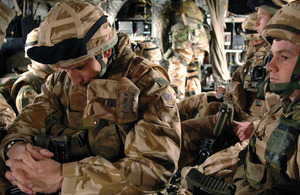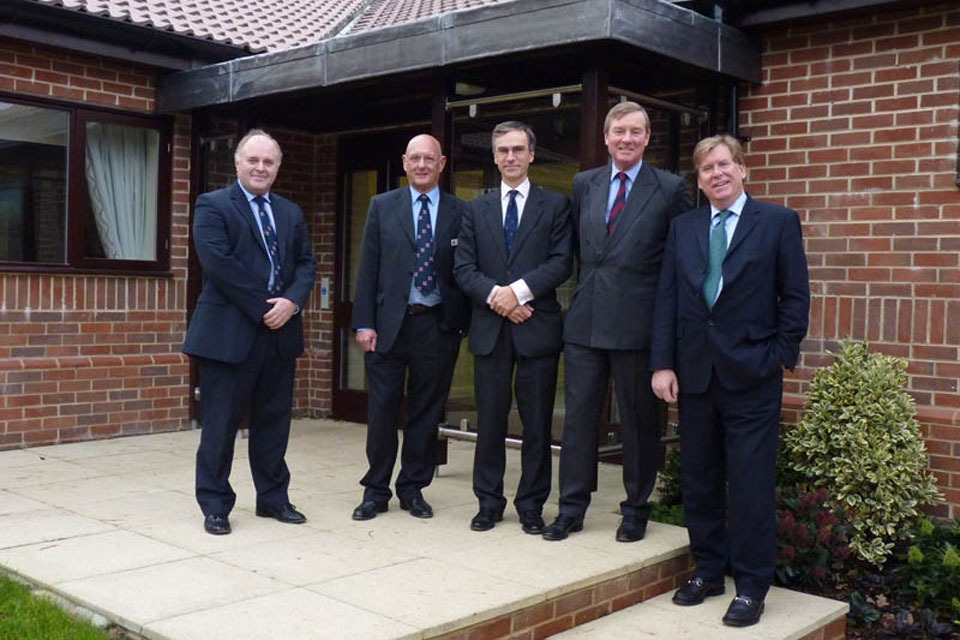Improved mental health services pledged for Armed Forces
A pledge to further improve mental health services for the Armed Forces through a programme of joint working was made by Ministers during a visit to the Combat Stress headquarters in Surrey yesterday.

The support of a group helps many troops cope with the traumatic experiences of combat (stock image) [Picture: Crown Copyright/MOD 2009]
The Ministry of Defence and Department of Health announced that, along with the Armed Forces charity Combat Stress, they would continue to work together to move forward the recommendations of the ‘Fighting Fit’ report into military mental health produced by former Royal Navy doctor, Dr Andrew Murrison.
Dr Murrison was asked by the Prime Minister to undertake an independent study into the mental health of both serving and ex-Service personnel to see what more could be done to assess and meet their needs.
The subsequent report, ‘Fighting Fit’, was welcomed by the MOD and Department of Health.
Minister for Defence Personnel, Welfare and Veterans, Andrew Robathan, joined the Minister of State for Health, Simon Burns, and Dr Murrison at the Combat Stress headquarters in Surrey yesterday to discuss what further improvements can be made to mental health services for veterans.

From left: Malcolm Bellwood, Combat Stress Operations Manager South, Robert Bieber, Combat Stress Trustee, Dr Andrew Murrison, Andrew Robathan and Simon Burns [Picture: via MOD]
Mr Robathan said:
I am determined to ensure that our Armed Forces receive the best mental healthcare available, both while serving and after leaving the Service.
Along with my colleagues in the Department of Health and Combat Stress, I will do whatever I can to improve the services they receive.
Already, following the recommendations made in Dr Andrew Murrison’s study, we have announced plans to improve mental health services for veterans through the introduction of 30 mental health nurses and a 24-hour counselling and support helpline.
Mr Burns added:
Servicemen and women give so much to our country and the NHS must do whatever it can to reduce the impact that this can have on their mental health.
Work is already underway on delivering a dedicated 24-hour support line for veterans, and we are working closely with Combat Stress and other Service charities to ensure that veterans receive the care that they deserve.
The MOD operates a range of measures to tackle mental health issues among the Armed Forces. In Afghanistan, community psychiatric nurses are on hand to provide any care and treatment needed and are supported by visiting consultant psychiatrists. In addition, two UK-based teams of psychiatrists and mental health nurses are available to deploy to Afghanistan at short notice, if required.
There are 15 military Departments of Community Mental Health across the UK which provide outpatient mental healthcare. These teams are made up of psychiatrists and mental health nurses, with support from clinical psychologists and mental health social workers.
A wide range of psychiatric and psychological treatments are available, including medication, psychological therapies and environmental adjustment. The MOD works with a group of NHS Trusts to provide inpatient care; these arrangements mean that most patients can be treated near their units.
When back in the UK, Reservists can benefit from the Reserves’ Mental Health Programme, which offers assessment and treatment for those in need. A similar scheme has also been introduced for MOD civilians who have deployed and might need such follow-up help.
For veterans, the MOD is working with the NHS and Combat Stress to make sure GPs are telling veterans about the support available and to ensure that the NHS understands the culture of the military.
There are community mental health pilots for veterans at six NHS Trusts across the UK. Centred on the patient and GP, these arrangements aim to make it easier for veterans to seek help and are advertised in a number of ways, including through GPs and local branches of the Royal British Legion.